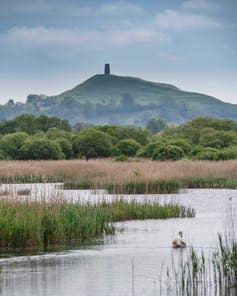[ad_1]

Wetlands are the superheroes of the natural environment. They are crammed with wildlife, shield our coastlines, retain our rivers clean, and shop local climate-switching amounts of carbon.
Nevertheless via considerably of background they have been at best disregarded and at worst vilified and ruined. In recent years general public strategies and money have been thrown at tree planting and reforestation, yet hardly a mention was provided to restoring the UK’s bogs, swamps and marshes. But a brief scan by way of famed literature, paintings and even movies and Television collection will demonstrate you how typically wetlands feature as the unpleasant, sinister backdrop of dark storylines.
Fortuitously, matters are now modifying. This was highlighted with the modern announcement of a 15,000-acre Somerset Wetlands nationwide mother nature reserve. This is the UK’s next so-identified as “super reserve” right after Purbeck Heaths in Dorset. These reserves take in a mosaic of distinctive habitats, and by linking them all alongside one another as part of an entire landscape management program, it is hoped the area as a full will profit.
In this situation, the new tremendous reserve will encompass existing reserves on Somerset’s stages and moors, a area of coastal plains, fens, reedbeds and saltmarshes, which make up the heart of the county.
These regions are believed to include all-around 11 million tonnes of carbon, in the variety of peat: semi-decomposed lifeless plant substance. When peatlands dry out – possibly since they are drained to make farmland or when peat is extracted for compost – the vegetation decomposes a large amount more quickly, releasing carbon into the environment.
A lot of Somerset’s peat deposits have been weakened over the generations, and proceed to be so, releasing hundreds of countless numbers of tonnes of greenhouse gasses every single year. Their security as carbon sequestering powerhouses is vital if the United kingdom is to strike its net zero objectives in the coming a long time.
The saltmarshes on the edge of the new reserve are also carbon-dense habitats and can shield the shoreline during storms and sea stage rises. Then there is the wildlife that teems in this region, from otters and kingfishers to eels and marsh fritillaries (a person of Britain’s rarest butterflies).
Well-preserved history
It is not just the environmental and all-natural positive aspects provided by the wetlands of the new tremendous reserve that make the challenge so special.
Britain’s record and heritage is tied up in this area and the acidic, waterlogged peatland disorders signifies it is uniquely preserved for us to explore. For occasion the UK’s oldest picket walkway, the Sweet Monitor, was built 6,000 decades in the past to support Neolithic men and women cross the marshes. Because it was uncovered in the 1970s it has helped archaeologists have an understanding of how these folks lived.
It may also only be a touch melodramatic to state that England as we know it would not exist if it hadn’t been for the Somerset amounts and moors “fen-fastness” (as described in the Anglo-Saxon Chronicle), presenting King Alfred the refuge and battleground his modest pressure necessary when preventing the Vikings in the 800s. (Even though whether he burnt some cakes in the course of action is up for historical debate).
Huge-scale protection
It is not just the Somerset area that will see the added benefits of the proposed landscape-scale administration plans – the overall region will be richer. Of course, some of the space is already under the supervision of conservation organisations and they are accomplishing a wonderful career. But this project goes over and above people particular person web pages and delivers them all alongside one another on a bigger scale.
Properly managed specific mother nature reserves, no make any difference what the measurement, can be great. But it is when we join-up these pockets and grow them that we can seriously start to command waterflows, maximise biodiversity, decrease carbon emissions and enhance our possess wellbeing. Indeed, investigate is demonstrating it’s at this scale that we can have a serious impression and harness the possible of “nature-centered solutions” which allow for all-natural ecosystems to help tackle the weather and biodiversity disaster.
When these spots are big enough and dominated by coastal and freshwater wetlands then the benefits are magnified, as it’s not just a landscape-scale staying seemed at, or even the seascape, but the “wholescape”.
This “wholescape” technique must be the way forward if we are critical about the use of nature-centered alternatives this century. And nature’s superheroes — our wetlands – want super mother nature reserves like the a single in Somerset to show us just what they can do.
This article is republished from The Discussion underneath a Resourceful Commons license. Go through the first article.

Christian Dunn does not operate for, check with, possess shares in or acquire funding from any company or organisation that would gain from this report, and has disclosed no related affiliations further than their academic appointment.
[ad_2]
Resource hyperlink









More Stories
How to Evaluate a Franchise – 4 Key Points to Consider!
21 Secrets to Franchise Business Success
The Advantages of a Franchise